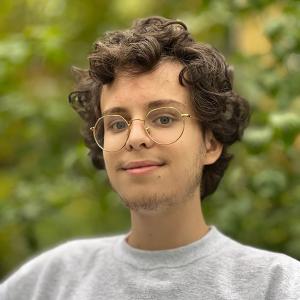When I was a kid, I loved astronomy, and dreamed of being an astronaut. One night, as I was lying in bed, I began contemplating the size of the universe–as one does at nine years old. When I fully realized that space is just a void that we and our planet happen to be sitting in, I developed a sinking fear of wide open spaces that I still have today (my greatest fear, besides the presence of zombies, is drifting off, untethered, into space to meet a slow death à la Alfonso Cuarón’s Gravity).
In some ways, college forced me to confront this fear of empty space within a safe, non-physical realm, for the most part. One type of space was surrounded by the question of who I was, and what interested me. I’ve detailed an examination into the kinds of space I’ve been dealt while at Oberlin, and how I’ve approached inhabiting those spaces.
To start off, college in general gives you a lot of space, perhaps more space than you’ve ever been given in your life. Within a liberal arts program like Oberlin, you’re given the space to explore a myriad of disciplines under the tutelage of people who are incredibly accomplished in their field. When I was graduating high school, there was a running joke that I would “major in Everything except math” when I got to Oberlin. And in some ways, this ended up being the case. Though I could only realistically pick two majors, and the department that I wanted to minor in only offered majors, I still like to say that I spiritually majored in “Everything except math.” I took classes on archaeology, anthropology, Asian American history, Russian history from roughly 800 to the 1860, cognitive science, social psychology, Bollywood, biology, economics, sociology, the city of Chicago, a form of Japanese drumming called taiko, creative writing, Shakespeare, animation, “strange cinema,” Chinese literature and film, the list goes on. Though I knew I didn’t have the money or time to major in everything I was interested in (or else I’d be here for the next ten years), the experiences I had in fields I previously knew nothing about were very special.
The liberal arts framework of Oberlin gives you the space to listen, and most importantly, to learn. For me, this gave me the chance to fully own my learning, and with the freedoms that are given for final projects in most classes, I was able to develop my voice not only as a learner and a thinker, but also as a person. This semester, I applied theories of nationalism and ethnosymbolism to some of my favorite martial arts films of all time, Ip Man, and Ip Man 2, in my final essay for the Theory and History of Global Cinema. For my American Gothic class, I just finished making a podcast in the style of Aaron Mahnke’s Lore (if you’re into spooky, non-fiction stories about historical events and folklore, I highly recommend it) about the real-life event that inspired Game of Thrones’s Red Wedding incident, the Massacre of Glencoe. I happen to be descended from the MacDonald family, so researching, writing, and recording a podcast about an event that unfortunately happened to some of my ancestors was a trip, to say the least.
But aside from academics, college gives you the space to pursue your own interests in student organizations, whether they be artistic, identity-based, and/or political. It may seem a bit overwhelming at first to consider just how many student organizations there are on campus, but I’ve found that they break down the campus in a really nice way, giving you some familiar faces and names outside of the people you meet in class. I got my start with the radio station, WOBC, and found my groove with the Asian American Alliance, and sometimes you really only need one or two organizations that can provide you with a strong feeling of community.
Lastly, there’s a certain psychic space that college allows for personal growth and reflection, especially for those coming from environments that are different from the town of Oberlin. One of my professors on one of the last days of classes quipped that, for most of us, our childhoods are gradually extinguished in college. In my last year of high school, I knew I had a strong sense of who I was and what I wanted to do with my life, and I thought that that was a true marker of adulthood. Over the first couple years of college, I learned that that was definitely not the case, as it’s common for one to feel like they have no idea what they’re doing. Out of that realization, I allowed myself to become vulnerable towards myself as a work-in-progress, gradually finding comfort in my own state of perpetual change. I learned how to be an advocate for myself and others, how to articulate my strengths and worth to potential employers, and how to deal with frustrating circumstances in healthy and productive ways by running, swimming, or rock-climbing. I used to groan whenever my mom would request that I have an open mind about something, but now I understand why. Life has a funny way of pulling the rug out from under us.
I am still afraid of wide open spaces, but what I’ve learned in college is that not all of them have to be black holes. That’s a ridiculous statement, yes, but the void of adulthood remained a looming threat for my first two years here. Space, whether physical or imagined, has an extraordinary psychological effect on us, and I’ve been enormously lucky to have found spaces of warmth and community that have enabled me to succeed academically and otherwise.



